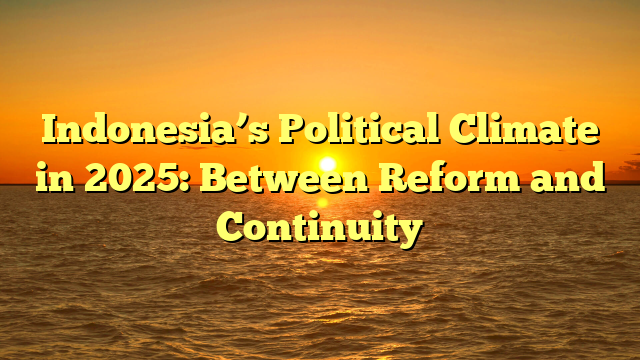Indonesia, the world’s largest archipelagic state and the third-largest democracy, is experiencing a period of political transition in 2025. The country’s political climate reflects both the legacy of past leadership and the expectations of a new administration tasked with guiding the nation maritim4d through economic, social, and global challenges.
The 2024 general elections marked a pivotal moment, ending a decade under President Joko Widodo (popularly known as Jokowi). His leadership focused heavily on infrastructure expansion, industrial development, and strengthening Indonesia’s global profile. The new administration inherits both the successes and unresolved challenges of Jokowi’s era. Key issues include narrowing economic inequality, ensuring regional balance in development, and sustaining growth in the face of global uncertainty.
Domestically, coalition politics remain a defining feature of governance. With no single party strong enough to dominate parliament, political coalitions are necessary to form stable governments. While this fosters inclusivity, it also creates obstacles to decisive policymaking. Leaders must often compromise with coalition partners, diluting reform agendas in order to maintain political stability. Critics argue that such arrangements risk prioritizing political interests over public needs, especially in crucial sectors such as healthcare, education, and environmental protection.
The state of democracy in Indonesia is another central issue. Elections are largely considered free and competitive, yet concerns persist about political polarization, misinformation, and the erosion of democratic institutions. Civil society groups continue to warn about the weakening of checks and balances, particularly regarding the judiciary and independent commissions. Identity politics, often rooted in religion and ethnicity, also remain a divisive force. Addressing these tensions while protecting democratic principles is one of the most pressing challenges for the current government.
Corruption continues to cast a long shadow over Indonesian politics. The Corruption Eradication Commission (KPK), once seen as a symbol of integrity, has faced setbacks in recent years due to legal and institutional changes that reduced its independence. Many Indonesians view the fight against corruption as essential to restoring trust in government institutions. Strengthening anti-corruption efforts, improving transparency, and ensuring accountability are therefore at the heart of public expectations.
On the international stage, Indonesia maintains its role as a regional leader within ASEAN and an influential voice in global forums such as the G20 and the United Nations. The country’s foreign policy emphasizes neutrality and multilateral cooperation, while also addressing pressing security concerns in the Asia-Pacific, including maritime disputes in the South China Sea. At the same time, Indonesia seeks to attract foreign investment to support its economic transformation, particularly in renewable energy, digital innovation, and green infrastructure.
Looking forward, Indonesia’s political trajectory will depend on how effectively the government balances continuity with meaningful reform. The administration must manage global economic pressures, navigate domestic political complexities, and respond to citizens’ calls for better governance. The strength of its democracy, the fairness of its institutions, and the inclusiveness of its development policies will determine whether Indonesia can fulfill its potential as a leading democratic power in Asia.
As the nation enters this new chapter, the stakes are high. The choices made in the coming years will not only define Indonesia’s domestic stability but also shape its influence in the wider region. With its vast resources, young population, and strategic position, Indonesia stands at a crossroads — one where reform and continuity must work together to secure a more democratic and prosperous future.
